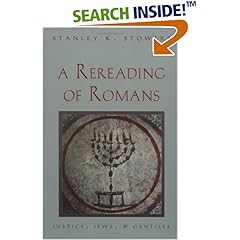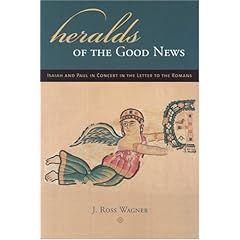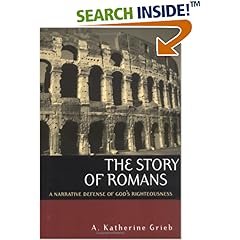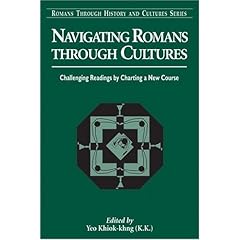Friday, May 25, 2007
Thursday, May 24, 2007
Cruciformity: The Fundamental Option of Israel (part 2)

The Fundamental Option serves as an appropriate heuristic in that it reasonably recounts the commitment that Israel was to have with YHWH. Israel’s most basic formulation of the Shema (Deut. 6.4) not only declared that YHWH was one, but intimated fidelity in that Israel was to have no other gods. Implicit in this was that both the construction and worship of idols was forbidden in the people of God. Rather Israel’s FO was bound up in YHWH’s own steadfast love and compassionate faithfulness, which in turn required Isreal’s response of undying love and faithfulness within a covenant that Hosea likened to one of marriage. Thus the Shema was always to be a proclamation of devotion and love to the one incomparable God. Thus for Israel, according to the scriptures of Israel, love for God was a total, complex response to God’s initiative. It had both an affective and an ethical (even political) dimension, the former consisting of self- abandonment, devotion, and trust, loyalty and obedience. Gorman notes that the love of YHWH is thus a politic idiom, in that it requires the pledge to the policies of YHWH, thus to love God is to refuse every other ultimate love or loyalty. In sum, Gorman concludes that to love God is to trust and to be faithful.
In using the rubric of FO Gorman is giving us a helpful heuristic in what can already be seen to anyone with a basic understanding of the writings of the NT as the great continuity of thought with the scriptures of Israel; namely trust and faithfulness.
Wednesday, May 23, 2007
Open Source: a conversation about faith and reason
OPEN SOURCE with Chris Lydon has a wonderful piece on religion in response to the ongoing Christopher Hitchens charictiture of religion. Guest experts are The Rev. Dr. A. K. M. Adam and The Rev. Dr. Allen Dwight Callahan, well worth the 45 minutes.
Technorati tags: A. K. M. Adam, Allen Dwight Callahan, Christopher Hitchens, Faith and Reason, Open Source, Christopher Lydon
Top Ten Monographs on Romans (in no particular order)
 Stowers, Stanley K. A Rereading of Romans: Justice, Jews, and Gentiles. New Haven: Yale University Press, 1994.
Stowers, Stanley K. A Rereading of Romans: Justice, Jews, and Gentiles. New Haven: Yale University Press, 1994.
This book blew me away, it shattered a number of my long held convictions about the letter to the Romans, and made me reread the letter a number of times. I was not, and am not now, entirely convinced about all of Stowers' arguments. But it made me take seriously Paul's call as an apostle to the nations.
 Keesmaat, Sylvia C. Paul and His Story: (Re)Interpreting the Exodus Tradition. JSNTSup 181; Sheffield: Sheffield Academic Press, 1999.
Keesmaat, Sylvia C. Paul and His Story: (Re)Interpreting the Exodus Tradition. JSNTSup 181; Sheffield: Sheffield Academic Press, 1999.
Sylvia wrote this as here Ph.D. thesis under Tom Wright, and it is the book that made me pursue my own thesis in Romans. Although it only deals with Romans 8, it does a wonderful job of teasing out the exodus narrative throughout that chapter. She continues to write amazing stuff on Paul having a skill at merging together serious biblical studies with thought provoking contemporary theology. Check out here more accessible Colossians remixed.
 Wagner, J. Ross. Heralds of the Good News: Isaiah and Paul in Concert in the Letter to the Romans. Leiden: Brill, 2003.
Wagner, J. Ross. Heralds of the Good News: Isaiah and Paul in Concert in the Letter to the Romans. Leiden: Brill, 2003.
Another product of a Ph.D. and student of Richard Hays. This work applies Hays' methodological master piece 'Echoes' to the texts of Romans 9-11. Wagner is brilliant and methodical in his use of the second Isaianic corpus as a pretext for unlocking the 'meaning' of this tricky section in Paul's letter.
 Grieb, A. Katherine. The Story of Romans: A Narrative Defense of God's Righteousness. Louisville: Westminster John Knox Press, 2002.
Grieb, A. Katherine. The Story of Romans: A Narrative Defense of God's Righteousness. Louisville: Westminster John Knox Press, 2002.
Argues that Romans is a narrative defense of God's Righteousness, a lot of good stuff are packed into this little gem. This is a short work and probably the most accessible work on this list.
 Yeo, Khiok-Khng. Navigating Romans through Cultures : Challenging Readings by Charting a New Course, Romans through History and Culture Series. New York: T & T Clark International, 2004.
Yeo, Khiok-Khng. Navigating Romans through Cultures : Challenging Readings by Charting a New Course, Romans through History and Culture Series. New York: T & T Clark International, 2004.
This is a collection of essays that takes as its starting point the inability to interpret a text outside of ones own context. Some of the best thought provoking readings on the letter to be compiled into a monograph. My personal favorite is Monya Stubbs' piece on Romans 13.
 Elliott, Neil. The Rhetoric of Romans: Argumentative Constraint and Strategy, and Paul's Dialogue with Judaism. JSNTSup 45; Sheffield: JSOT Press, 1990.
Elliott, Neil. The Rhetoric of Romans: Argumentative Constraint and Strategy, and Paul's Dialogue with Judaism. JSNTSup 45; Sheffield: JSOT Press, 1990.
Not the first work to deal with rhetoric in Paul, but it was the first work I read on the subject. Rhetoric helps us make better sense of the letter, and anybody who ignores both ancient and modern rhetoric in the study of Romans will have a definite disadvantage of making sense out of Paul's argument.
 Stendahl, Krister. Final Account: Paul's Letter to the Romans. Minneapolis: Fortress, 1995.
Stendahl, Krister. Final Account: Paul's Letter to the Romans. Minneapolis: Fortress, 1995.
This short little work changed the way I interpret Romans 2.1, Stendahl is such an important figure in Pauline studies, and this work gives you a glimpse of why that is.
 Nanos, Mark D. The Mystery of Romans: The Jewish Context of Paul's Letter. Minneapolis: Fortress, 1996.
Nanos, Mark D. The Mystery of Romans: The Jewish Context of Paul's Letter. Minneapolis: Fortress, 1996.
When I read this work I was totally unprepared for the richness and lucidity of the arguments found inside. It was such a fresh way of reading Romans that even while writing this I am reminded that I have to read this again. The big splash this book made was in the re-interpretation of the 'weak' and 'strong'.
 Esler, Philip Francis. Conflict and Identity in Romans: The Social Setting of Paul's Letter. Minneapolis: Fortress Press, 2003.
Esler, Philip Francis. Conflict and Identity in Romans: The Social Setting of Paul's Letter. Minneapolis: Fortress Press, 2003.
Very strong work on the dynamics of group identity and how Paul went about forming a new group identity out of competing influences. The best social scientific reading of the Letter to date!
 Tobin, Thomas H. Paul's Rhetoric in Its Contexts: The Argument of Romans. Peabody: Hendrickson Publishers, 2004.
Tobin, Thomas H. Paul's Rhetoric in Its Contexts: The Argument of Romans. Peabody: Hendrickson Publishers, 2004.
There is so much good in this work, although a reasoned approach, I feel it ties the letter to the Romans to tightly to the letter to the Galatians. But that being said it is very thought provoking and at times quite convincing.
Tuesday, May 22, 2007
The Dangers of Localism

To be a born-again communitarian is widely considered today as the sign of a critical standpoint, leftism, and progress. Come back community, from the exile to which the modern State confined you; all is forgiven and forgotten--the oppressiveness of parochiality, the genocidal propensity of collective narcissism, the tyranny of communal pressures and the pugnacity and despotism of communal discipline. It is, of course, a nuisance that one finds in this bed some unwelcome and thoroughly repulsive fellows. How to keep the bed to oneself, how to prove that the unwelcome fellows have no right to be in it--this seems to be the problem.
Zygmunt Bauman, "The Making and Unmaking of Strangers," in Debating Cultural Hybridity, 56.
Friday, May 18, 2007
Robin Scroggs on the Cross
 The cross is the revelation of who the God of Israel truly is - a God who gives life by grace, who does not rule the cosmos by domination and power. The cross reveals the new world controlled by a new definition of power. The cross thus is not a sign of weakness or suffering for its own sake. The cross is the revelation of eschatological reality and is guidance for all who must live in two worlds at the same time, the world of love as power and the world of domination as power.
The cross is the revelation of who the God of Israel truly is - a God who gives life by grace, who does not rule the cosmos by domination and power. The cross reveals the new world controlled by a new definition of power. The cross thus is not a sign of weakness or suffering for its own sake. The cross is the revelation of eschatological reality and is guidance for all who must live in two worlds at the same time, the world of love as power and the world of domination as power.Robin Scroggs, "Paul: Myth Remaker. The Refashioning of Early Ecclesial Traditions," in Pauline Conversations in Context: Essays in Honor of Calvin J. Roetzel, ed. Janice Capel Anderson, Philip Harl Sellew, and Claudia Setzer (JSNTSup 221; London: Sheffield Academic Press, 2002), 100.
Tuesday, May 15, 2007
Monday, May 14, 2007
Cruciformity: The Fundamental Option (part 1)
In an effort to explain faith in Paul’s thought Gorman uses the terminology of Fundamental Option, and more specifically FO as described by Josef Fuchs. Gorman finds in the nomenclature of FO a useful way to talk about Paul’s notion of how human beings are basically oriented either toward or away from God. The FO when rightly ordered toward God may be refereed to simply as love of God. This love of God can be described as the total surrender to self-commitment in loving God. But love of God can only happen in overcoming the innate human tendency to do evil, which is only possible through complete abandonment to God as Father, as shown through the example of Jesus the Christ, and the narrative out workings of the cross. Thus the required self-surrender of the person to God requires a grace, a power, from outside the person.
Thursday, May 10, 2007
Cruciformity: Narrative Patterns of the Cross
In chapter five Gorman seeks to set the groundwork for the rest of his book. He does this primarily through looking at the master text, or the text that best explains Paul's narrative understanding of the cross. Gorman sees this foundational text as Phil 2.6-11 ( even though Paul probably did not create this text he most certainly owned it).
In summation Gorman states that, ' For Paul, to be in Christ is to be a living exegesis oft his narrative of Christ, a new performance of the original drama of exaltation following humiliation, of humiliation as the voluntary renunciation of rights and selfish gain in order to serve and obey.'
Gorman then lays out what he sees as the four narrative patterns of Cruciformity:
- Cruciformity as faithful obedience, or cruciform faith.
- Cruciformity as voluntary self-emptying and self giving regard to others. This includes: love, grace, sacrifice, altruism/substitution, self giving, voluntary self-humbling/abasement, and incarnation and suffering. This is also called cruciform love.
- Cruciformity as paradox, namely life giving suffering and the transformative potency of weakness. This includes: paradoxical power and wisdom, interchange of character between Christ and believers, the apocalyptic victory and the liberation of new life and transformation, and reconciliation and justification. This is also called cruciform power.
- Cruciformity as the pattern of reversal, it is the requisite prelude to resurrection and exaltation, or cruciform hope.
Is Bono a Christian?
BONO: ...My understanding of the Scriptures has been made simple by the person of Christ. Christ teaches that God is love. What does that mean? what it means for me: a study of the life of Christ. Love here describes itself as a child born in straw poverty, the most vulnerable situation of all, without honor. I don't let my religious world get too complicated. I just kind of go: Well, I think, I know what God is. God is love, and as much as I respond [sighs] in allowing myself to be transformed by that love and acting in that love, that's my religion.Where things get complicated for me, is when I try to live this love. Now, that's not so easy.
....
MICHKA: As I told you, I think I am beginning to understand religion because I have started acting and thinking like a father. What do you make of that?
BONO: Yes, I think that's normal. It's a mind-blowing concept that the God who created the Universe might be looking for company, a real relationship with people, but the thing that keeps me on my knees is the difference between Grace and Karma.
MICHKA: I haven't heard you talk about that.
BONO: I really believe we've moved out of the realm of Karma into one of Grace.
MICHKA: Well, that doesn't make it clearer for me.
BONO: You see, at the center of all religions is the idea of Karma. You know, what you put out comes back to you: an eye for an eye, a tooth for a tooth, or in physics - in physical laws - every action is met by an equal or an opposite one. It's clear to me that Karma is at the very heart of the Universe. I'm absolutely sure of it, and yet, along comes this idea called Grace to upend all that "As you reap, so will you sow" stuff. Grace defies reason and logic, Love interrupts, if you like, the consequences of your actions' which in my case is very good news indeed, because I've done a lot of stupid stuff.
....
MICHKA: The son of God Who takes away the sins of the world. I wish I could believe in that.
BONO: But I love the idea of the Sacrificial Lamb. I love the idea that God says: Look, you cretins, there are certain results to the way we are, to selfishness, and there's mortality as part of your very sinful nature, and, let's face it, you're not living a very good life, are you? There are consequences to actions, the point of the death of Christ is that Christ took on the sins of the world, so that what we put out did not come back to us, and that our sinful nature does not reap the obvious death. That's the point, It should keep us humbled...It's not our own good works that get us through the gates of Heaven.
Wednesday, May 09, 2007
Christopher Hitchens on God

Christianity Today on line is hosting a series of debates between Christopher Hitchens of God is Not Great, and Doug Wilson (of whom I know nothing). I must admit that I am sort of a closet Hitchens fan, here is a man that knows exactly how to use vitriolic rhetoric. If Doug has any hope in this forum, he ought to bring up the war (a little bit off topic but take that!). I would really love to see Tom Wright and Hitchens go at it, I think Wright has the wit to disarm Hitchens.
HT: by living waters
Tuesday, May 08, 2007
Prince to take time off to study the bible

 Apparently Prince is in London to do some shows (only 30 ponds a ticket), and after he is going to take some time to study the bible. Perhaps he an Bono can come together and do a new study bible...
Apparently Prince is in London to do some shows (only 30 ponds a ticket), and after he is going to take some time to study the bible. Perhaps he an Bono can come together and do a new study bible...HT: Londonist
Cruciformity: The Cruciform Power of the Spirit

Gorman sets up his discussion of the Spirit of God by noting that it is usually associated with power: the power of creation, of spiritual and moral transformation, and ultimately of new creation. This context is extremely important to keep in mind in the following discussion.
Gorman’s rather catchy description of Paul as an uncharismatic charismatic is not only clever it is very interesting. He takes the two meanings of the term charismatic namely, someone with a magnetic personality and one who is dynamic in leadership, and someone who is possessed by the Spirit of God. In terms of the former Paul is a self assessed uncharismatic (presumably Paul must be speaking of his style in public speeches, because his letters show at least a semblance of rhetorical sophistication). In terms of the latter Paul is charismatic, in that his ministry was driven by his Spirit inspired gifts. Where the term uncharismatic charismatic becomes interesting (and not just clever anymore) is Gorman’s ability to show the interconnectedness of spirit and power.
For Gorman it is in Paul’s experience and his resulting understanding of the Spirit which is the key to understanding the paradoxical symbiosis of power and weakness.
There is more to say on the Spirit and Gorman certainly does, but if I have any hopes of finishing this series the post have to be rather short.
On another note Michael Gorman is flirting with his own blog!
Saturday, May 05, 2007
My Accent
| What American accent do you have? Your Result: The Inland North You may think you speak "Standard English straight out of the dictionary" but when you step away from the Great Lakes you get asked annoying questions like "Are you from Wisconsin?" or "Are you from Chicago?" Chances are you call carbonated drinks "pop." | |
| The Northeast | |
| The Midland | |
| Philadelphia | |
| The South | |
| North Central | |
| The West | |
| Boston | |
| What American accent do you have? Quiz Created on GoToQuiz | |
Wednesday, May 02, 2007
Mental Meanderings

I noticed that a London Indie band is attempting to give it's music away for free in hopes of broadening their fan base. I often thought that this would be a great new way for indie bands to make it in the ever changing music scape. Here is my idea for an up and coming indie band. First, make sure you can play. Next, record a CD with the people who know what they are doing. Then tour college towns distributing free CD's two weeks before the show in the local Uni papers. The idea is that enough people will dig your music to come out and pay to see you play, and these potential fans being familiar with your music, might actually make a connection with you and support you in your future en devours. Oh and this idea is under a creative commons license!
On a slightly unrelated point, Patrik Hagman over at God in a Shrinking Universe has a series on Tillich and Indie Music, and more recently Patrik has a link to Naomi Klein's article on the problems over at the World Bank. Here is a teaser:
Wolfowitz's only crime was taking his institution's international posture to heart. The fact that he has responded to the scandal by hiring a celebrity lawyer and shopping for a leadership "coach" is just more evidence that he has fully absorbed the World Bank way: When in doubt, blow the budget on overpriced consultants and call it aid.
Technorati tags: Indie Music, Naomi Klein, Patrik Hagman, World Bank






